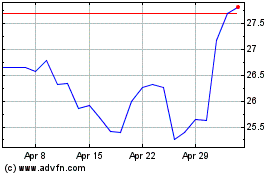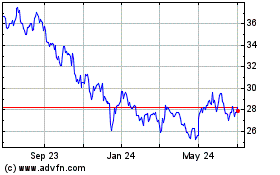Pfizer Fined $107 Million for Overcharging U.K. for Epilepsy Drug
December 07 2016 - 8:50AM
Dow Jones News
LONDON—Pfizer Inc. has become the latest drugmaker taken to task
for high prices after U.K. authorities slapped the company with a
record £ 84.2 million ($107 million) fine over the price of an
anti-epilepsy drug.
The Competition and Markets Authority said Wednesday that Pfizer
and drug-distribution company Flynn Pharma broke competition law by
charging unfair prices in the U.K. for phenytoin sodium capsules,
an anti-epilepsy drug used by around 48,000 patients in the
country.
The CMA said the Pfizer fine was the highest it had ever
imposed. The regulator also fined Flynn Pharma £ 5.2 million and
has ordered both companies to reduce their prices.
Spokespeople for Pfizer and Flynn Pharma said the companies
rejected the CMA's findings and would appeal all aspects of the
decision.
Drug prices have become a hot political issue in the U.S., where
companies are free to set the price and increase it at any time.
The issue is less incendiary in the U.K., where the price of drugs
typically is well-controlled.
The CMA said Pfizer and Flynn Pharma took advantage of a
peculiarity of the U.K. system. The price of branded drugs is
determined by negotiations between the government and
pharmaceutical companies. Unbranded, or generic, drugs may be
freely priced, but competition between suppliers typically drives
the cost down.
The regulator said Pfizer and Flynn Pharma "deliberately
debranded" the drug in 2012 to raise the price and were able to do
so because there were no competing suppliers.
The CMA said the price of a 100-milligram pack of phenytoin
sodium shot up—to £ 67.50 from £ 2.83—after Pfizer sold the rights
to sell the drug to Flynn Pharma in September 2012. It said the
price decreased to £ 54 in May 2014. Before the agreement, Pfizer
had sold phenytoin sodium capsules directly to U.K. wholesalers and
pharmacies under the brand name Epanutin.
The price increase was partly because Pfizer, which continued to
manufacture phenytoin sodium, sold the drug to Flynn Pharma at up
to 17 times the price than it charged wholesalers and pharmacies
previously, the regulator said. Flynn Pharma hiked the price
further still.
The case has echoes of the scandal that gained U.S.
pharmaceutical executive Martin Shkreli widespread notoriety over
the past year and a half. His company, Turing Pharmaceuticals,
bought the rights to Daraprim, a half-century-old drug that treats
a parasitic infection, and raised the price more than 50-fold.
A spokeswoman for Pfizer said the company "approached this
divestment with integrity and believes it fully complies with
established competition law."
She said phenytoin capsules were unprofitable for Pfizer before
the deal with Flynn Pharma and the transaction secured ongoing
supply of the medicine. The spokeswoman added that the price
charged by Flynn Pharma was 25% to 40% lower than that for an
equivalent, branded epilepsy medicine whose price was
regulated.
Philip Marsden, the chairman of the case decision group for the
CMA investigation, said the companies "deliberately exploited the
opportunity offered by debranding to hike up the price of a drug
which is relied upon by many thousands of patients."
Although Pfizer said the drug was unprofitable before
debranding, the losses would have been recovered within two months
of the price rises, Mr. Marsden said.
"There is no justification for such rises when phenytoin sodium
capsules are a very old drug for which there has been no recent
innovation or significant investment," he said.
A spokesman for Flynn Pharma said the CMA's judgment used "an
entirely novel theory as to the level of margin that can be made by
a generic company [that] has never been discussed, let alone
agreed, with the pharmaceutical industry."
Warwick Smith, director-general of the British Generic
Manufacturers Association, an industry body, said Pfizer and Flynn
Pharma's behavior "broke the virtuous cycle" between innovator and
generic companies in which drugs that lose patent protection
sharply fall in price, allowing the health system to afford the
higher prices for new medicines.
"We would never support activity designed purely to artificially
increase prices," he said.
Write to Denise Roland at Denise.Roland@wsj.com
(END) Dow Jones Newswires
December 07, 2016 08:35 ET (13:35 GMT)
Copyright (c) 2016 Dow Jones & Company, Inc.
Pfizer (NYSE:PFE)
Historical Stock Chart
From Mar 2024 to Apr 2024

Pfizer (NYSE:PFE)
Historical Stock Chart
From Apr 2023 to Apr 2024
